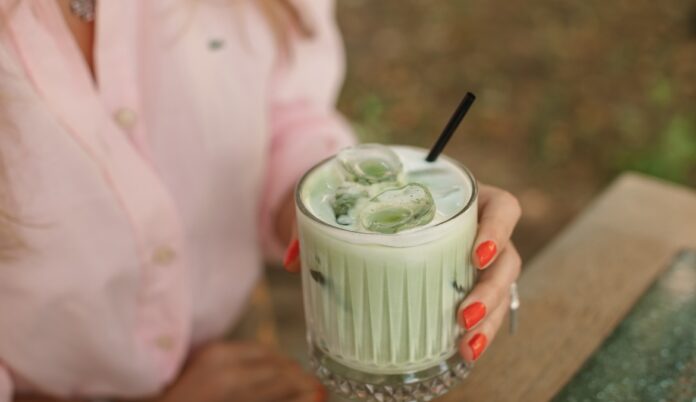These questions, answered forward, courtesy of Brooklyn–based mostly dietitian Maddie Pasquariello, MS, RDN, of East Coast Well being.
How a lot caffeine does matcha comprise?
“Typically talking, a gram of matcha powder—which generally equates to round a half teaspoon—comprises round 30 milligrams of caffeine,” says Pasquariello, though some manufacturers might have as a lot as 40 to 45 milligrams of caffeine per gram. “Most manufacturers available on the market advocate utilizing about 1 teaspoon of matcha powder per cup of liquid, in the end equating to round 60 to 70 milligrams or so of caffeine, usually a bit extra relying on the model.” (For reference, the FDA says that adults can safely eat as much as 400 milligrams of caffeine per day.)
Nonetheless, Pasquariello says there are a number of elements that may affect how caffeinated your cup of matcha will probably be, such because the brewing methodology, the kind of powder you utilize, and the serving dimension. Some manufacturers, she provides, course of their powder to yield a good larger caffeine content material. Matcha’s caffeine content material can also be influenced by the point of harvest, climate situations all through progress, and the age of the leaves (with caffeine content material truly fizzling out because the leaves become older), per a 2021 assessment revealed within the journal Molecules.
All that to say: Whereas 30 milligrams of caffeine per gram of matcha is an effective ballpark, there’s some variability in caffeine content material between manufacturers (and even between cups). So when you’re involved about your caffeine consumption, it’s a good suggestion to learn labels and/or ask your barista for insights.
FWIW, when you take to caffeine simply high quality, a noon cup of matcha may work in your favor. A 2021 research within the journal Vitamins discovered that matcha consumption improved consideration and work efficiency below stress higher than caffeine alone.
Caffeine in matcha vs. inexperienced tea
Pasquariello says that matcha is often larger in caffeine content material than inexperienced tea. Inexperienced tea packs solely about 29 milligrams of caffeine per cup, whereas matcha, as talked about above, can have round 60 to 70 milligrams per cup.
This may appear complicated, since inexperienced tea and matcha are constituted of the identical factor: inexperienced tea leaves. However the discrepancy between the 2 drinks “has to do principally with how the tea is brewed,” Pasquariello explains. “Within the case of matcha, you are whisking the powder—which is manufactured from very finely floor tea leaves—into water and consuming it in a extra concentrated format.” In the meantime, inexperienced tea merely infuses water with the tea leaves, then strains and discards them.
In different phrases, matcha presents the total leaf (learn: peak caffeine *and* antioxidant potential) in powdered kind.
Is caffeine in matcha larger than espresso?
No, matcha nonetheless has much less caffeine than espresso. Pasquariello notes that a typical cup of drip espresso will usually pack round 100 milligrams of caffeine. (As is the case with matcha, the caffeine content material in your most well-liked cup of joe will range based mostly on brew methodology, length, serving dimension, model, and comparable elements.)
“Decaf espresso, relying on selection, comprises about zero to 6 milligrams of caffeine per cup,” Pasquariello provides, “so matcha’s caffeine content material falls someplace in between the 2.”
Is matcha higher than espresso for anxiousness?
Pasquariello says that matcha could also be center floor for many who want one thing stronger than decaf or inexperienced tea, however can’t fairly abdomen extra strong caffeinated bevs like espresso. “Many individuals expertise that matcha delivers extra of a ‘gradual burn’ form of caffeine launch, protecting their power ranges extra secure than they could usually really feel with caffeine,” she explains. “This may be useful for many who expertise caffeine jitters or elevated anxiousness when ingesting espresso.”
That is largely as a result of the truth that teas (together with matcha) have L-theanine, an amino acid with antioxidant properties that may promote calm within the physique. “L-theanine acts as a buffer through the digestion course of, which helps forestall jitters and the crash that’s usually related to espresso,” Christina Manian, RDN, beforehand instructed Effectively+Good. And apparently, a small 2018 research revealed within the journal Vitamins discovered that individuals who drank matcha had decrease stress and anxiousness ranges than individuals who drank a placebo.
The takeaway
Matcha isn’t only a fantastically pigmented beverage with wealthy heritage and rituals for making it. It’s additionally an honest supply of caffeine, so you might wish to rethink your matcha latte break at work or your subsequent beverage order at brunch if you’re attempting to restrict caffeine consumption.
Pasquariello advises listening to your physique and avoiding an excessive amount of caffeine typically to maintain undesirable signs at bay. “Needless to say caffeine can have an effect on sleep—protecting you awake longer than meant and stopping you from sleeping restfully—in addition to digestion, resulting in nausea or GI discomfort for some,” she cautions.


